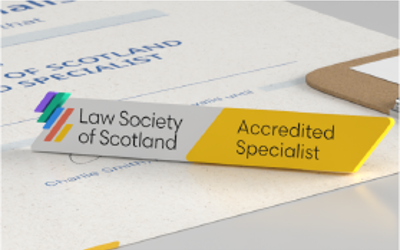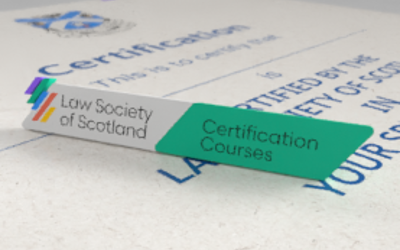Our accreditation scheme recognises solicitors who demonstrate distinction in Family Law. It is a hallmark of excellence that peers and clients can trust.
Benefits of an accreditation in Family Law
- Progress your career faster
- Increase your profile within the industry
- Create potential for additional revenue streams through external referrals
Knowledge and application of the Law
Applicants should demonstrate a high level of knowledge and experience in the area of Family Law. The application should include evidence that the applicant has been engaged in a broad spectrum of practice in the Family Law field throughout the five year period under review. Examples provided in the application should demonstrate expertise at high levels of most of the following:
- Separation Agreements
- Pre-Nuptial Agreements
- Pre Cohabitation Agreements
- Agreements prepared in respect of termination of cohabitation
- Proceedings raised under the Family Law (Scotland) Act 1985
- Proceedings raised under the Family Law (Scotland) Act 2006
- Free standing proceedings raised under Section 11 of the Children (Scotland) Act 1995
- Proceedings in relation to domestic abuse.
When considering the strength of the application, the panel will consider the:
- Role of the applicant and the work outlined – whether the applicant was the lead or a relatively junior member of a team; and
- The complexity of the work – whether the examples cited involve work that is relatively straightforward, or involved novel or untested points.
The panel will award more credit where the applicant has demonstrated a leading role in a range of complex or novel matters rather than crediting simple volume of work and/or dealing with fairly straightforward matters.
Knowledge and application of procedures
All applicants should demonstrate the breadth of their work in the field in their application. Examples of contentious and non contentious work should be provided. It is recognised that in the Family Law field, most matters are resolved extra judicially. Accordingly, while it is of use for the panel to consider cases in which proceedings have indeed been raised, and indeed where proceedings have gone to a full conclusion and the issue of a Judgment, the panel recognises that as earlier indicated, the bulk of Family Law Practitioners work will involve the satisfactory conclusion of cases by way of Minutes of Agreement.
Applicants who have been engaged in the practice of Family Law for the relevant five year period should be able to demonstrate a high level of working knowledge of the practical application of Family Law in the Court of Session and/ or in the Sheriff Court by highlighting complex or novel cases they have been involved with.
Applicants in practice who focus on more non contentious aspects of Family Law and who do not have extensive Family Law experience in Court in the relevant period should provide the panel with an indication of whether or not they have gained such experience prior to the period under consideration.
Applicants should highlight any relevant qualifications gained, training received and courses attended during the five year period and similarly should highlight any work carried out in the training area.
Membership
Any applicant who is a member of the Scottish Child Law Centre, the Family Law Association, Consensus Scotland, or other relevant body, who is an Accredited Family Law Arbitrator, or who is an Accredited Family Law Mediator should make reference to this in their application.
Knowledge sharing
Applicants should provide any available evidence of presenting Seminars, teaching, responding to the government consultation and writing materials on Family Law topics, whether in house or for other public bulletins.
Next steps

Becoming an Accredited Specialist
Find out what you need to do to become an accredited specialist.

Apply now
Log in to complete the application form

Contact us
Have a question regarding accreditation? Contact us here

Clients want and deserve specialist advice when going through one of the most life changing of events such as a relationship breakdown, separation and divorce. Family Law is a rich, sometimes complicated, speciality deploying good legal knowledge as well as excellent people skills. It’s also an area that’s hard work.
When setting up the North East’s first specialist family law practice, accreditation as specialists in family and child law helped Patience and Buchan stand out from the crowd. Since then, it’s remained an important part of our business – encouraging our solicitors to pursue accreditation as part of their career development and providing clients with specialist advice in family and child law and offering family mediation.
The Law Society’s accreditation system rightly recognises those lawyers who are proven experts in their field of accreditation whether that’s family law, child law or family mediation.

My practice often involves instruction in high value financial provision on divorce claims. Sophisticated clients are used to instructing specialist professionals in other disciplines. Increasingly such clients are attracted to Law Society accredited specialists when choosing their solicitor.
To achieve accreditation, solicitors have to demonstrate a high level of knowledge and experience in family law. They require experience at Sheriff Court and Court of Session level but should also be able to demonstrate a good track record of resolving cases extra-judicially. Many accredited specialists are qualified in Collaborative law or as family law arbitrators. Accreditation by the Law Society as a family law mediator can also be important.
I would highly recommend a career as a specialist family lawyer. There is no typical day in the office. The work in this area is varied, challenging, thought-provoking and rewarding.


